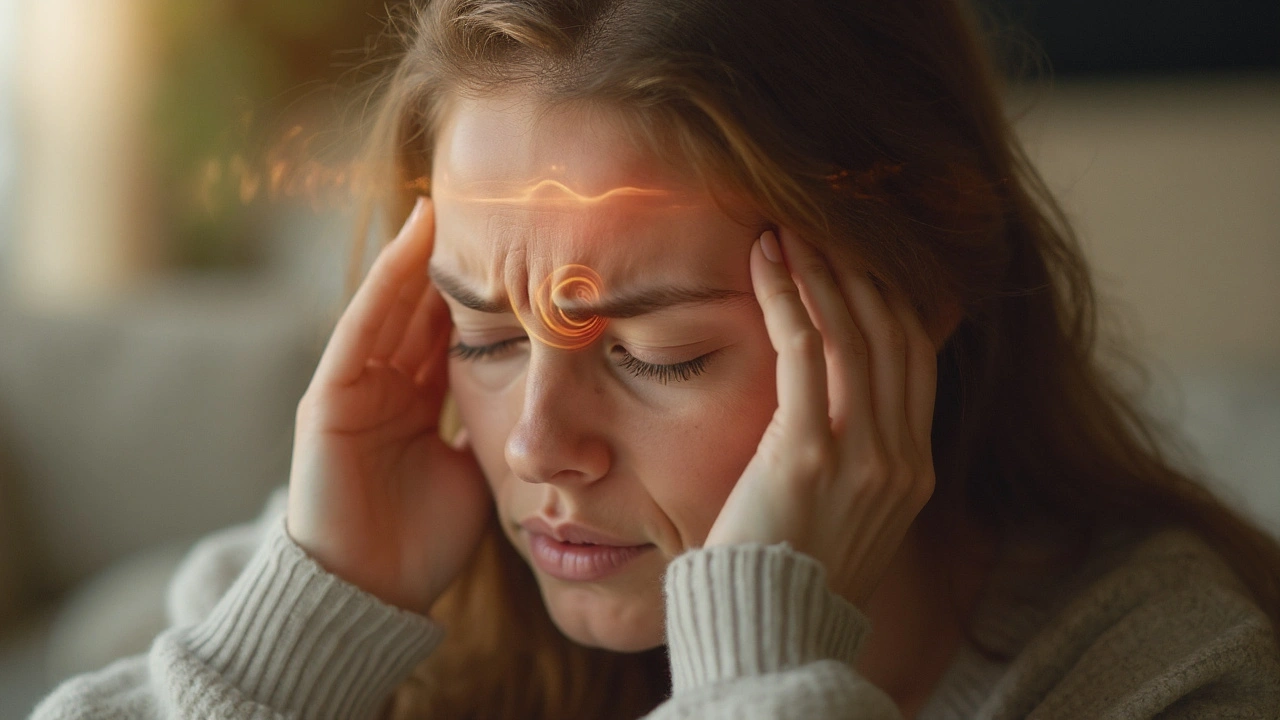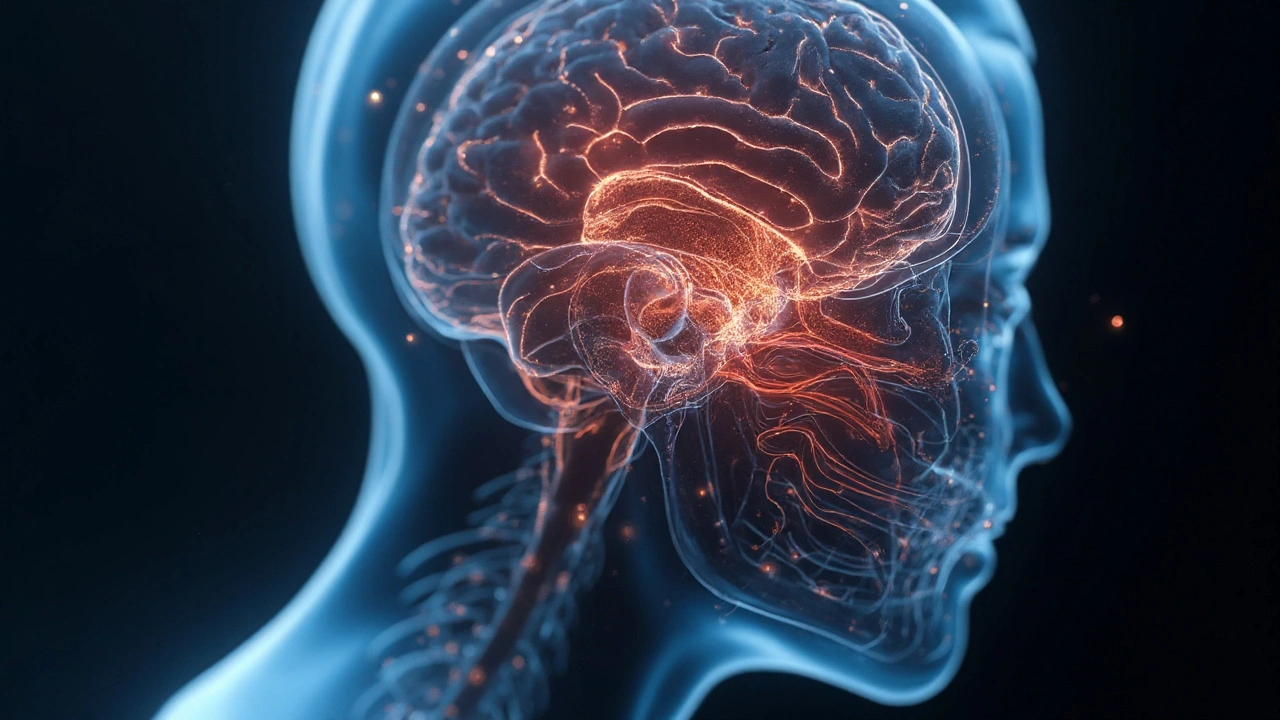Migraine and Tinnitus: How Headaches Cause Ringing in the Ears
 Sep, 25 2025
Sep, 25 2025
Migraine-associated tinnitus is a condition where the neurological processes that trigger a migraine also stimulate the auditory system, leading to persistent or intermittent ringing in the ears. It sits at the crossroads of vascular, neural and inner‑ear factors, making it a unique diagnostic puzzle. While many people think of migraines as just severe head pain, up to 30% of chronic migraine patients report some form of tinnitus a phantom sound perceived without an external source, often described as ringing, buzzing or hissing. Understanding the migraine tinnitus link can help clinicians and sufferers break the cycle of pain and sound.
Why the Connection Exists: The Neurovascular Theory
Two major mechanisms pull migraines and tinnitus together:
- Cortical spreading depression a wave of neuronal and glial depolarization that sweeps across the cortex disrupts blood flow and triggers the classic migraine aura. When this wave reaches the auditory cortex the brain region that processes sound, it can temporarily fire auditory neurons, creating phantom sounds.
- The trigeminal nerve the main pain conduit in migraine attacks releases neuropeptides that cause vasodilation in the inner ear’s tiny vessels. This vascular dysregulation can alter cochlear homeostasis, precipitating tinnitus.
Both pathways hinge on serotonin a neurotransmitter that modulates pain, vascular tone and auditory signaling. Fluctuations in serotonin levels are a hallmark of migraine attacks and also affect the inner ear’s fluid balance, offering a biochemical bridge.
Key Players and Their Roles
Below is a quick rundown of the major entities that intertwine migraine and tinnitus.
- Migraine a recurrent neurological disorder marked by throbbing head pain, often accompanied by nausea, photophobia and aura
- Tinnitus the perception of sound without an external source, affecting up to 15% of the general population
- Aura transient neurological disturbances (visual, sensory, or auditory) that precede or accompany a migraine
- Trigeminal nerve the fifth cranial nerve that transmits pain signals during migraine attacks
- Cortical spreading depression the electrophysiological event that initiates aura and propagates vascular changes
- Vestibular migraine a subtype where balance disturbances and ear‑related symptoms dominate
- Inner ear (cochlea) the sensory organ that converts sound vibrations into neural signals
Comparing Migraine, Tinnitus and Vestibular Migraine
| Condition | Primary System Affected | Common Triggers | Typical Duration |
|---|---|---|---|
| Migraine | Neurovascular (brain) | Stress, caffeine, hormonal changes | 4-72 hours |
| Tinnitus | Auditory (cochlea & auditory pathways) | Loud noise, ototoxic meds, hypertension | Persistent or intermittent |
| Vestibular migraine | Balance centers (vestibular system) | Sleep deprivation, bright lights, diet | Minutes to days |
Clinical Signs That Hint at a Migraine‑Tinnitus Link
Doctors use a pattern‑recognition approach. Look for these clues:
- Headache onset coincides with sudden ringing or it worsens during a migraine attack.
- Presence of visual aura plus auditory disturbances (often described as “whooshing” or “pulsatile” sounds).
- Improvement of both headache and tinnitus after taking a migraine‑specific medication such as a triptan.
- History of vestibular migraine symptoms - dizziness, imbalance - alongside tinnitus.
When these signs appear together, neuroimaging is usually unnecessary; a detailed symptom diary can clinch the diagnosis.

Managing the Double Whammy: Practical Strategies
Because the two conditions share triggers, addressing one often eases the other.
- Trigger journal: Record meals, stress levels, sleep quality, and weather changes. Over a month, patterns emerge - for many, caffeine spikes or missed meals line up with both headache and ringing.
- Diet tweaks: Limit tyramine‑rich foods (aged cheese, red wine) and artificial sweeteners, both of which can provoke serotonin swings.
- Stress control: Practice short‑duration mindfulness or diaphragmatic breathing. Studies from Australian headache clinics show a 25% reduction in migraine frequency when stress‑reduction techniques are applied daily.
- Medication timing: Use acute migraine meds (triptans) early - within the first 30 minutes of aura - to prevent the downstream vasodilatory cascade that may affect the inner ear.
- Sound therapy: Low‑level white‑noise generators can mask tinnitus without worsening migraine sensitivity. Portable phone apps with gentle nature sounds work well during a migraine episode.
- Sleep hygiene: Aim for 7-9 hours, keep a consistent bedtime, and avoid screens an hour before sleep. Sleep deprivation raises both serotonin turnover and cortical excitability.
When to Seek Professional Help
If any of the following occur, a specialist should be consulted:
- Sudden, severe ringing that appears with visual loss - could signal a vascular emergency.
- Persistent tinnitus lasting more than 6 months despite migraine control.
- New neurological symptoms such as weakness, slurred speech, or severe vertigo.
Neurologists, otolaryngologists and audiologists often collaborate on “head‑ear” clinics, offering combined imaging, audiometry and headache assessment.
Related Concepts Worth Exploring
Understanding the migraine‑tinnitus link opens doors to several adjacent topics:
- Phonophobia: sound sensitivity that spikes during migraine attacks.
- Ototoxic medications: certain antibiotics and chemotherapy agents that can trigger tinnitus and sometimes exacerbate migraine.
- Blood pressure fluctuations: hypertensive spikes are a common prodrome for both headache and ringing.
- Genetic predisposition: family studies suggest shared genetic markers for migraine and chronic tinnitus.
Future articles could dive into each of these, linking back to the central theme of neuro‑vascular‑auditory interplay.
Frequently Asked Questions
Can migraines cause permanent tinnitus?
Most migraine‑related tinnitus is temporary, resolving as the headache subsides. However, repeated attacks can lead to lasting changes in cochlear blood flow, potentially making the ringing chronic. Early trigger management reduces this risk.
Is a hearing test necessary for migraine patients?
If ringing appears only during migraine episodes, a full audiogram isn’t always required. A basic screening can rule out underlying hearing loss, but the primary focus should be on headache control.
Do triptans make tinnitus worse?
Generally, triptans alleviate both pain and associated tinnitus by curbing the vasodilatory wave. Rarely, individuals report a brief increase in ringing after dosing, likely due to rapid vascular shifts. If this happens, discuss alternative abortive options with a doctor.
What lifestyle changes help both conditions?
Consistent sleep, regular moderate exercise, limiting caffeine, staying hydrated, and stress‑reduction techniques (like yoga or progressive muscle relaxation) have the strongest evidence for reducing migraine frequency and tinnitus intensity.
Is vestibular migraine the same as tinnitus?
No. Vestibular migraine primarily affects balance and spatial orientation, though many patients also experience tinnitus. It’s a subtype where ear‑related symptoms are prominent, but the underlying migraine mechanisms remain the same.
Can over‑the‑counter pain relievers worsen tinnitus?
NSAIDs like ibuprofen are generally safe, but high doses can occasionally increase blood pressure, indirectly aggravating tinnitus. Acetaminophen at therapeutic levels is neutral. Always follow dosing guidelines.
Are there particular foods that trigger both migraine and ringing?
Aged cheeses, processed meats, and red wine contain tyramine, which can spike serotonin and trigger both headache and tinnitus. Reducing these foods often yields noticeable improvement.


virginia sancho
September 25, 2025 AT 06:31Hey everyone, just wanted to say that if you keep a simple trigger journal you might spot patterns you never thought of. Even a tiny note about coffee intake or a stressful meeting can be a game‑changer. It also helps when you talk to your doc because you have concrete data. Definately give it a try, and don’t worry if you miss a day – the key is consistency. Hope this helps!
Namit Kumar
October 8, 2025 AT 00:04The pathophysiology described aligns with current neurovascular models, particularly the role of serotonin in modulating both cortical spreading depression and cochlear blood flow. By targeting serotonergic pathways, triptans can mitigate the cascade that leads to auditory disturbances. It is advisable to administer abortive therapy early in the aura phase to prevent downstream effects. :)
Sam Rail
October 20, 2025 AT 17:37Not bad, but the article could've cut the fluff.
Damon Farnham
November 2, 2025 AT 10:11Indeed,, the interplay between cortical spreading depression and inner‑ear vasodilation is a fascinating nexus,, one that beckons further inquiry,, yet the prose sometimes wades into unnecessary verbosity,, obscuring rather than illuminating the core mechanisms.
Gary Tynes
November 15, 2025 AT 03:44Love the practical tips! keeping a journal is key it helps you see patterns quickly and honestly. also, try gentle yoga or breathing exercises they’re low‑impact but mighty. don’t forget to stay hydrated especially if caffeine is your trigger – water helps keep the blood vessels stable. keep pushin forward, you got this!
Marsha Saminathan
November 27, 2025 AT 21:18When migraines and tinnitus collide, it feels like a storm of sound and pain dancing together in a chaotic symphony that refuses to end. The first wave of cortical spreading depression sweeps across the brain like a sudden blackout, pulling the auditory cortex into its tumultuous path, and suddenly the ears whisper their own tale of ringing. This neurovascular cascade is not just a medical curiosity; it is a vivid reminder that our nervous system is an intricate tapestry where every thread vibrates with others. Imagine the tiny vessels of the cochlea as delicate glass tubes, and serotonin as the mischievous conductor that can dilate them one moment and constrict them the next, altering the fluid balance that keeps sound in check. Over time, repeated attacks can etch a lingering echo, turning what was once a fleeting whoosh into a stubborn hum that lingers in the background of daily life. That persistent hum can erode concentration, mute the joy of favorite music, and even cast a shadow over the simplest of conversations. Yet hope glimmers in the strategies outlined: a diligent trigger journal becomes a map, highlighting the hidden valleys of caffeine spikes or missed meals that precipitate both headaches and ringing. Dietary tweaks, especially cutting out tyramine‑rich cheeses and red wine, can calm the serotonin rollercoaster, while stress‑relief practices such as mindful breathing act like a soothing lullaby for the over‑excited cortex. Early intervention with triptans, taken within that golden half‑hour window, can halt the vascular fireworks before they ignite the inner ear. Sound therapy, whether a gentle white‑noise app or a soft nature soundtrack, offers a comforting blanket that masks the phantom tones without aggravating migraine sensitivity. Consistent sleep, a cornerstone of neurological health, stabilizes the brain’s excitability, reducing both aura and auditory misfires. Collaboration between neurologists, otolaryngologists, and audiologists forms a multidisciplinary shield, ensuring that no aspect of this complex puzzle is overlooked. Remember, each small adjustment-hydration, posture, screen time-acts like a gear in a massive clock, nudging the system toward harmony. In the end, mastering the double whammy is less about fighting a relentless foe and more about dancing gracefully with the rhythm of your own body. Stay patient, celebrate small victories, and trust that the brain's plasticity will eventually rewrite the noisy script.
Justin Park
December 10, 2025 AT 14:51One might ponder whether the echo of tinnitus is merely a symptom or a signal, a reminder that our perception is as mutable as the clouds that drift across a restless mind 😊. In embracing this duality, we learn that managing migraine is not just about suppressing pain, but about tuning the entire orchestra of our senses.
Herman Rochelle
December 23, 2025 AT 08:24Exactly, the timing of medication is crucial; catching the aura early can make all the difference in preventing downstream effects.
Stanley Platt
January 5, 2026 AT 01:58Indeed,, the observation concerning verbosity is well‑taken; brevity, when coupled with precision, often yields greater clarity,, and thus should be pursued in future discourse.
Alice Settineri
January 17, 2026 AT 19:31Yo, that ringing thing is a total brain‑party crash, let’s shut it down!